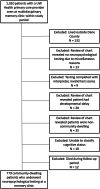Comparing emergency department use among individuals with varying levels of cognitive impairment
- PMID: 35501721
- PMCID: PMC9059422
- DOI: 10.1186/s12877-022-03093-5
Comparing emergency department use among individuals with varying levels of cognitive impairment
Abstract
Introduction: As the population ages, Alzheimer's disease and related dementias (ADRD) are becoming increasingly common in patients presenting to the emergency department (ED). This study compares the frequency of ED use among a cohort of individuals with well-defined cognitive performance (cognitively intact, mild cognitive impairment (MCI), and ADRD).
Methods: We performed a retrospective cohort study of English-speaking, community-dwelling individuals evaluated at four health system-based multidisciplinary memory clinics from 2014-2016. We obtained demographic and clinical data, including neuropsychological testing results, through chart review and linkage to electronic health record data. We characterized the frequency and quantity of ED use within one year (6 months before and after) of cognitive evaluation and compared ED use between the three groups using bivariate and multivariate approaches.
Results: Of the 779 eligible patients, 89 were diagnosed as cognitively intact, 372 as MCI, and 318 as ADRD. The proportion of subjects with any annual ED use did not increase significantly with greater cognitive impairment: cognitively intact (16.9%), MCI (26.1%), and ADRD (28.9%) (p = 0.072). Average number of ED visits increased similarly: cognitively intact (0.27, SD 0.72), MCI (0.41, SD 0.91), and ADRD (0.55, SD 1.25) (p = 0.059). Multivariate logistic regression results showed that patients with MCI (odds ratio (OR) 1.62; CI = 0.87-3.00) and ADRD (OR 1.84; CI = 0.98-3.46) did not significantly differ from cognitively intact adults in any ED use. Multivariate negative binomial regression found patients with MCI (incidence rate ratio (IRR) 1.38; CI = 0.79-2.41) and ADRD (IRR 1.76, CI = 1.00-3.10) had elevated but non-significant risk of an ED visit compared to cognitively intact individuals.
Conclusion: Though there was no significant difference in ED use in this small sample from one health system, our estimates are comparable to other published work. Results suggested a trend towards higher utilization among adults with MCI or ADRD compared to those who were cognitively intact. We must confirm our findings in other settings to better understand how to optimize systems of acute illness care for individuals with MCI and ADRD.
Keywords: ADRD; Dementia; Health care utilization; Mild cognitive impairment.
© 2022. The Author(s).
Conflict of interest statement
The authors declare that they have no competing interests.
References
-
- Statistics FIFoA-R. Older Americans 2016: Key Indicators of Well-Being. 2016. https://agingstats.gov/index.html
-
- Center NIoAAsaRDEaR. What Is Dementia? National Institutes of Health. Updated December 31, 2017. Accessed 24 Aug 2018. https://www.ncbi.nlm.nih.gov/pubmed/
Publication types
MeSH terms
Grants and funding
LinkOut - more resources
Full Text Sources
Medical
Research Materials


